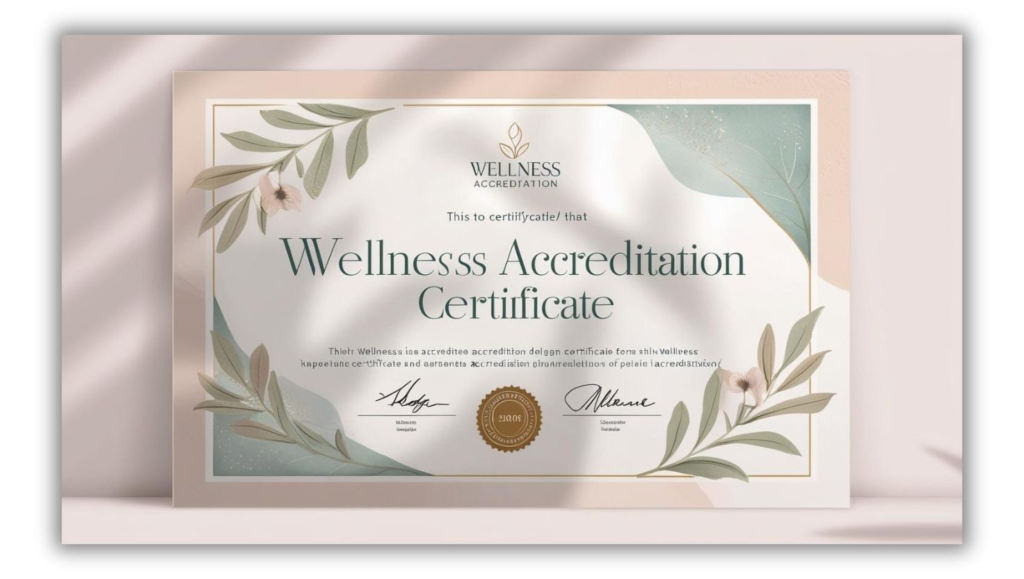What is Wellness Accreditation?
Accreditation is a formal, third-party recognition or certification that an institution, organization, or program meets specific standards set by an authoritative body. This process ensures that the entity adheres to certain quality benchmarks, complies with industry norms, and provides reliable and valid services, programs, or educational content.

Purpose of Accreditation
- Quality Assurance: Ensures that the entity or program consistently meets specific standards of quality.
- Credibility: Helps build trust and confidence with stakeholders, such as students, parents, and employers.
- Eligibility for Funding: In education, accredited institutions are often eligible for government or institutional funding.
- Global Recognition: For institutions and programs that are internationally accredited, there is greater recognition and respect for their quality.
Wellness Accreditation
Wellness accreditation refers to the process through which organizations, such as wellness centers, health clubs, fitness facilities, or corporate wellness programs, are recognized for meeting specific health and wellness standards. These standards are designed to ensure that the wellness programs, services, and practices provided are effective, evidence-based, and promote the overall health and well-being of participants.
Key Aspects of Wellness Accreditation
Health and Safety Standards: Wellness centers and programs are assessed to ensure they maintain a safe and healthy environment for their members. This includes proper hygiene practices, safety protocols, and compliance with relevant health regulations.
Quality of Services: Accredited wellness programs must offer high-quality, scientifically-supported health services, such as fitness training, nutrition counseling, mental health support, and stress management. Accreditation ensures that services are delivered by qualified professionals with relevant expertise.
Holistic Health Approach: Wellness accreditation often emphasizes a holistic approach to health, considering not just physical fitness but also mental, emotional, and social well-being. This includes promoting work-life balance, mindfulness, and overall quality of life.
Continuous Improvement: Accredited wellness organizations must commit to ongoing evaluation and improvement. This may involve regular assessments, feedback collection from members, and adaptations based on the latest wellness trends and research.
Program Effectiveness: The effectiveness of wellness programs is measured through participant outcomes, such as improvements in fitness levels, mental health, and overall well-being. Programs must demonstrate tangible results that meet the needs of participants.
Benefits of Wellness Accreditation
- Credibility and Trust: Accredited wellness programs are seen as trustworthy and professional, which can attract more members, clients, or employees.
- Competitive Advantage: Accreditation can differentiate a wellness center or program from competitors by showcasing its commitment to high standards and quality service.
- Improved Outcomes: Being held to rigorous standards ensures that wellness programs are more likely to produce meaningful, measurable improvements in participants’ health.
- Increased Funding: Some wellness programs, especially those in the public or corporate sector, may receive funding or recognition based on their accredited status.
Wellness Institut offers Accreditation in 6 different Categories
- Wellness courses (Starter, Medium, Large, Extra Large package)
- Wellness services (Starter, Medium, Large, Extra Large package)
- Wellness products (Starter, Medium, Large Package)
- Wellness retreats (Basic, Medium, Large package)
- Wellness profession (Junior Wellness Practitioner, Wellness Practitioner, Holistic Wellness Specialist, Wellness Ambassador)
- Wellness organisations (Basic, Intermediate, Advanced package)
Conclusion
Wellness accreditation is a valuable process that helps wellness organizations maintain high standards of quality, safety, and effectiveness. It ensures that participants are receiving comprehensive care that promotes long-term health benefits. Whether for a wellness center, a corporate wellness initiative, or a spa, accreditation boosts credibility, trust, and success in the competitive wellness industry.






